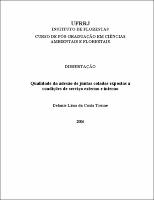Please use this identifier to cite or link to this item:
https://rima110.im.ufrrj.br:8080/jspui/handle/20.500.14407/11666Full metadata record
| DC Field | Value | Language |
|---|---|---|
| dc.creator | Tienne, Delanie Lima da Costa | pt_BR |
| dc.date.accessioned | 2023-11-19T22:28:20Z | - |
| dc.date.available | 2023-11-19T22:28:20Z | - |
| dc.date.issued | 2006-03-30 | |
| dc.identifier.citation | TIENNE, Delanie Lima da Costa. Qualidade da adesão de juntas coladas expostas a condições de serviço externo e interno. 2006. 68 f. Dissertação (Mestrado em Ciências Ambientais e Florestais) - Instituto de Florestas, Universidade Federal Rural do Rio de Janeiro, Seropédica - RJ, 2006. | por |
| dc.identifier.uri | https://rima.ufrrj.br/jspui/handle/20.500.14407/11666 | - |
| dc.description.abstract | The present paper had as objective to test the glued joints quality and strength before and after simulated exterior exposure conditions. The woods quaruba and pinus were glued with the Adhesives resorcinol, resorcinol with 10% de tannin and resorcinol with 20% de tannin were used in the 25°C e 60°C temperature, with 10% of methanol and without methanol. The strength tension perpendicular to grain and shear before and after exposure tests was made and with the better results of the shear strength tests was did a delaminating test in the glued joints. The two wood species presented restriction on tension perpendicular to grain strength, been necessary the device use to prevent the structure break. In both woods before and after exposure the 25°C temperature presented better results. Methanol improves de strength at the 60°C glued. The resorcinol adhesive when glued in pinus wood didn t presented significant differences between with and without heat and methanol, when was used in the quaruba wood the adhesive had a lower strength at 60°C. The adhesives with tannin in the composition presented better results without methanol in bath temperatures and with methanol at 60°C. The compositions glued in Pinus shown results acceptable in the delaminating test, but in the quaruba wood these results presented very high percentage. | eng |
| dc.description.sponsorship | Coordenação de Aperfeiçoamento de Pessoal de Nível Superior | pt_BR |
| dc.format | application/pdf | por |
| dc.language | por | por |
| dc.publisher | Universidade Federal Rural do Rio de Janeiro | por |
| dc.rights | Acesso Aberto | por |
| dc.subject | resorcinol | por |
| dc.subject | tanino | por |
| dc.subject | temperatura | por |
| dc.subject | metanol | por |
| dc.subject | serviços externos | por |
| dc.subject | resorcinol | eng |
| dc.subject | tannin | eng |
| dc.subject | temperature | eng |
| dc.subject | methanol | eng |
| dc.subject | external services | eng |
| dc.title | Qualidade da adesão de juntas coladas expostas a condições de serviço externo e interno | por |
| dc.type | Dissertação | por |
| dc.contributor.advisor1 | Nascimento, Alexandre Miguel do | pt_BR |
| dc.contributor.advisor1ID | 474.417.396-91 | por |
| dc.contributor.advisor1Lattes | http://buscatextual.cnpq.br/buscatextual/visualizacv.do?id=K4794854Y4 | por |
| dc.creator.ID | 090.078.044-70 | por |
| dc.creator.Lattes | http://buscatextual.cnpq.br/buscatextual/visualizacv.do?id=K4770010D7 | por |
| dc.description.resumo | O objetivo deste trabalho foi avaliar a qualidade e a resistência das juntas coladas antes e após condições simuladas de serviço externo. As madeiras quaruba e pinus foram coladas com os adesivos resorcinol, resorcinol com 10% de tanino e resorcinol com 20% de tanino, colados nas temperaturas de 25°C e 60°C, sem metanol e com 10% de metanol. Realizou-se testes de resistência à tração normal e ao cisalhamento antes e após a exposição. Com os melhores tratamentos encontrados no teste de cisalhamento foi realizado o teste de delaminação das juntas coladas. As duas madeiras apresentam restrições na resistência à tração normal, sendo necessário o uso de dispositivos para evitar ruptura caso seja necessário. Em ambas as madeiras após intemperismo à temperatura de 25°C apresentou melhores resultados. O metanol melhorou o processo de colagem a 60°C. O adesivo resorcinol quando usado para colagem do pinus não apresentou diferença de resistência entre as temperaturas ambiente e a 60°C tanto com quanto sem metanol, mas quando foi usado na madeira quaruba ele teve uma menor resistência a 60°C. Os adesivos com tanino na composição apresentaram melhores resultados sem metanol nas duas temperaturas e com metanol a 60°C. As composições coladas com pinus apresentaram resultados aceitáveis pelo teste de delaminação, porém a madeira quaruba apresentou níveis muito altos de delaminação. | por |
| dc.publisher.country | Brasil | por |
| dc.publisher.department | Instituto de Florestas | por |
| dc.publisher.initials | UFRRJ | por |
| dc.publisher.program | Programa de Pós-Graduação em Ciências Ambientais e Florestais | por |
| dc.subject.cnpq | Recursos Florestais e Engenharia Florestal | por |
| dc.thumbnail.url | https://tede.ufrrj.br/retrieve/14047/2006%20-%20Delanie%20Lima%20da%20Costa%20Tienne.pdf.jpg | * |
| dc.thumbnail.url | https://tede.ufrrj.br/retrieve/18402/2006%20-%20Delanie%20Lima%20da%20Costa%20Tienne.pdf.jpg | * |
| dc.thumbnail.url | https://tede.ufrrj.br/retrieve/24738/2006%20-%20Delanie%20Lima%20da%20Costa%20Tienne.pdf.jpg | * |
| dc.thumbnail.url | https://tede.ufrrj.br/retrieve/31139/2006%20-%20Delanie%20Lima%20da%20Costa%20Tienne.pdf.jpg | * |
| dc.thumbnail.url | https://tede.ufrrj.br/retrieve/37491/2006%20-%20Delanie%20Lima%20da%20Costa%20Tienne.pdf.jpg | * |
| dc.thumbnail.url | https://tede.ufrrj.br/retrieve/43889/2006%20-%20Delanie%20Lima%20da%20Costa%20Tienne.pdf.jpg | * |
| dc.thumbnail.url | https://tede.ufrrj.br/retrieve/50241/2006%20-%20Delanie%20Lima%20da%20Costa%20Tienne.pdf.jpg | * |
| dc.thumbnail.url | https://tede.ufrrj.br/retrieve/56713/2006%20-%20Delanie%20Lima%20da%20Costa%20Tienne.pdf.jpg | * |
| dc.originais.uri | https://tede.ufrrj.br/jspui/handle/tede/435 | |
| dc.originais.provenance | Made available in DSpace on 2016-04-28T14:56:09Z (GMT). No. of bitstreams: 1 2006 - Delanie Lima da Costa Tienne.pdf: 989145 bytes, checksum: ecb6e0498f0124716802ba2548f3909b (MD5) Previous issue date: 2006-03-30 | eng |
| Appears in Collections: | Mestrado em Ciências Ambientais e Florestais | |
Se for cadastrado no RIMA, poderá receber informações por email.
Se ainda não tem uma conta, cadastre-se aqui!
Files in This Item:
| File | Description | Size | Format | |
|---|---|---|---|---|
| 2006 - Delanie Lima da Costa Tienne.pdf | 966.06 kB | Adobe PDF |  View/Open |
Items in DSpace are protected by copyright, with all rights reserved, unless otherwise indicated.



